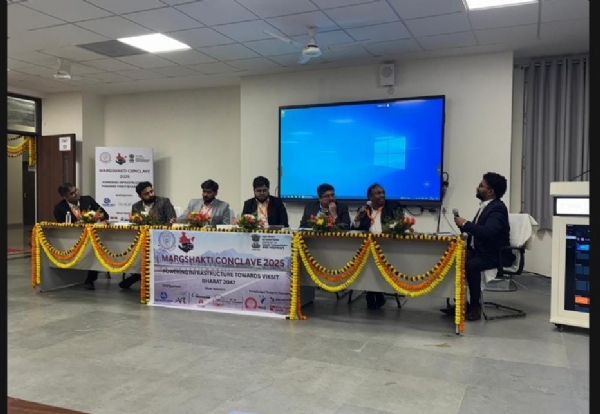
Varanasi,
22 Nov (HS): The MARGSHAKTI Industry Conclave, held at the prestigious Indian
Institute of Technology (IIT) BHU, gathered key figures across the
infrastructure, transportation, and urban development sectors to discuss the
future of India’s infrastructure as the nation gears up for a Viksit Bharat by
2047. The conclave, focusing on the theme Powering Infrastructure Towards
Viksit Bharat, kicked off with a welcome address from Dr. Ankit Gupta,
Professor and MoRTH Chair at the Department of Civil Engineering, followed by
insightful remarks from Prof. Amit Patra, Director of IIT (BHU). The conclave
was scheduled for 21 Nov-22 Nov 25 where various dignitaries participated.
The
Ministry of Road Transport and Highways (MoRTH) featured prominently in the
discussions, with a keynote address by Shri Vinay Kumar Rajawat, the Director
General and Special Secretary, who articulated MoRTH’s ambitious vision for
future-ready infrastructure. Highways for Viksit Bharat @2047 is not just a
dream; it is a commitment to enhance the connectivity and transport landscape
of India, emphasizing the crucial role of roads in the nation’s socio-economic
development were discussed.
The
conclave served as a platform for the release of various technology products,
implementation manuals, and reports developed by IIT (BHU)'s dedicated team,
focusing on transportation infrastructure planning and advanced pavement
design. These releases mark significant strides in the research and application
of innovative solutions tailored for the rapidly evolving infrastructure
sector.
A
special keynote presentation by Awanish Kumar Awasthi, IAS, Advisor to the Chief
Minister of Uttar Pradesh, addressed the potential for infrastructure
transformation in the state as it aspires to achieve a $1 trillion economy.
Uttar Pradesh stands at the threshold of an infrastructure revolution. By
investing in sustainable and efficient transport systems, we can pave the way
for economic growth that benefits all citizens were discussed during the
conclave.
The
conclave also hosted a dynamic panel discussion titled Nagar Path – Urban
Roads, Governance, Inclusive Mobility, and City Logistics, where experts
deliberated on the challenges and opportunities in urban planning and mobility.
A technical session, Samriddhi Ke Path – Tourism, Expressways, Logistics
Efficiency, and Industrial Development, further highlighted strategies for integrating
tourism with infrastructure development to maximize economic impact.
Representatives
from the Dedicated Freight Corridor Corporation of India Limited (DFCCIL),
including Shri Pankaj Saxena, Ex-Director (Project Planning), and Shri Mannu Prakash Dubey,
AGM/OP&BD/EDFC, shared valuable insights on the implications of the PM Gati
Shakti National Master Plan. The Gati Shakti initiative is a transformative
step aimed at enhancing logistics efficiency and strengthening connectivity
across the nation, thereby supporting India’s ambitious GDP growth targets.
A
detailed discussion was held during the conclave, focusing on business
strategies as well as the status of existing, commissioned, and upcoming
freight terminals in DFCCIL.
While
the conclave overwhelmingly exuded optimism, experts also cautioned against
complacency. Infrastructure development must be holistic, considering not just
economic progress but also environmental sustainability. We need to ensure that
the growth we envision is inclusive and benefits all sections of society.
The
MARGSHAKTI Industry Conclave proved to be a pivotal gathering, aligning the
aspirations of various stakeholders towards a common goal: a developed and
prosperous India by 2047. With ambitious plans in place and a strong commitment
to infrastructure development, India is decidedly on a path that promises not
just enhanced connectivity but also a transformative economic landscape. The
collaboration between academia, government, and industry showcased during the
conclave holds the key to achieving these ambitious milestones, inspiring hope
for a brighter future for the nation.
Hindusthan Samachar / Abhishek Awasthi








